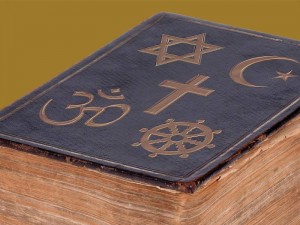On tv the other night I saw a couple of pundits debating whether Islam is a religion of peace or a religion of violence. Each side of the question was supported, easily enough, by quotes from the Qur’an and Hadith. Yet neither debater drew the obvious moral: namely, that Islam – like just about every religion I’m familiar with – contains both peaceful and violent strands, so that which sort of religion it “is” depends on which strands one emphasises.
And this points to a broader conclusion: the impossibility of “fundamentalism.”
 Fundamentalists are supposed to be people who embrace every provision of their religion’s scriptures and traditions in its most literal meaning. But any religion old enough or complicated enough to have left any sort of mark on the world is almost inevitably going to contain strands that cannot be reconciled except by interpreting one strand or the other in something other than the most obvious and literal sense, be the striving elements “Fight those who believe not in Allah nor the Last Day” and “Let there be no compulsion in religion,” or “He that hath no sword, let him sell his garment, and buy one” and “They that take the sword shall perish with the sword,” or for that matter “Congress shall have power … to promote the progress of science and useful arts by securing for limited times to authors and inventors the exclusive right to their respective writings and discoveries” and “Congress shall make no law … abridging the freedom of speech, or of the press.”
Fundamentalists are supposed to be people who embrace every provision of their religion’s scriptures and traditions in its most literal meaning. But any religion old enough or complicated enough to have left any sort of mark on the world is almost inevitably going to contain strands that cannot be reconciled except by interpreting one strand or the other in something other than the most obvious and literal sense, be the striving elements “Fight those who believe not in Allah nor the Last Day” and “Let there be no compulsion in religion,” or “He that hath no sword, let him sell his garment, and buy one” and “They that take the sword shall perish with the sword,” or for that matter “Congress shall have power … to promote the progress of science and useful arts by securing for limited times to authors and inventors the exclusive right to their respective writings and discoveries” and “Congress shall make no law … abridging the freedom of speech, or of the press.”
 And that means that every religious believer, so-called fundamentalists included, always chooses some provisions to interpret non-literally. Interpretation is inevitably made in the light of some vision of what is worth believing in: for example, is one’s religion to be essentially a doctrine of peace, with some oddball violent passages to explain away, or essentially a doctrine of violence, with some oddball pacific passages to explain away? The answer isn’t a given; it’s a choice. So the would-be fundamentalists’ trick of trying to evade reasoned arguments about right and wrong via appeals to authority of the form “Odin/Vishnu/Cybele said it, I believe it, and that’s the end of it” are fooling themselves (unless they can find a god who said so few things that all its pronouncements are easily reconciled in their most flat-footedly literal form, but how many gods are that dull and taciturn?). You need to have some independent idea of what a worthwhile God would command in order to decide what he did command.
And that means that every religious believer, so-called fundamentalists included, always chooses some provisions to interpret non-literally. Interpretation is inevitably made in the light of some vision of what is worth believing in: for example, is one’s religion to be essentially a doctrine of peace, with some oddball violent passages to explain away, or essentially a doctrine of violence, with some oddball pacific passages to explain away? The answer isn’t a given; it’s a choice. So the would-be fundamentalists’ trick of trying to evade reasoned arguments about right and wrong via appeals to authority of the form “Odin/Vishnu/Cybele said it, I believe it, and that’s the end of it” are fooling themselves (unless they can find a god who said so few things that all its pronouncements are easily reconciled in their most flat-footedly literal form, but how many gods are that dull and taciturn?). You need to have some independent idea of what a worthwhile God would command in order to decide what he did command.